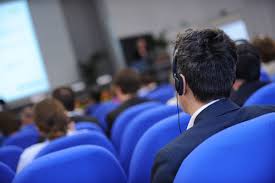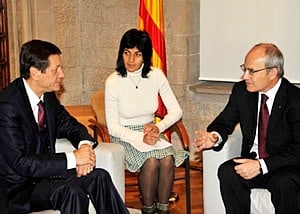Interpreting Services Part I: Modes of Conference Interpreting
Boston, MA, June 27, 2016 – Language Connections regularly provides comprehensive linguistic support at international conferences. It’s easy to imagine the immense planning and preparation that needs to take place in order for such a large event to go smoothly. Before the conference we will often provide translation services for our clients. This covers any written materials for event organizers, as well as brochures, lecture materials, and PowerPoint presentations for speakers. During the event we are responsible for full-scale interpreting services, including interpreting equipment, and assisting with the requirements of various modes of conference interpreting.
Maria Woyshner, Senior Interpreting Project Manager at Language Connections, explains the role of a language service provider at a large international conference: “Our services extend to every aspect of the conference – from large presentations involving hundreds of guests who require interpretation in multiple languages, to small group meetings, one-on-one discussions, international delegations and exhibition booths. Each situation requires a specific mode of interpreting; it is our responsibility to help our clients identify which type of service is best suited to meet their needs.”
Out of the responsibilities above, identifying which modes of conference interpreting are best for particular events can be one of our most important tasks. This is the basis from which all other decisions regarding specialized interpreting services must be made. There are various modes a client can choose from, but the three most commonly used for conference interpreting are Simultaneous Interpreting, Consecutive Interpreting and Relay Interpreting.
Modes of Conference Interpreting
 Simultaneous interpreting is the practice of interpreting while the content is being delivered by the speaker. During a conference, simultaneous interpreters are used for large presentations or lectures. Such events often require a team of interpreters working out of a soundproof booth or in a separate room using an audiovisual feed. Participants receive the interpreter’s speech using headsets and receivers. This is the type of interpreting used at the United Nations.
Simultaneous interpreting is the practice of interpreting while the content is being delivered by the speaker. During a conference, simultaneous interpreters are used for large presentations or lectures. Such events often require a team of interpreters working out of a soundproof booth or in a separate room using an audiovisual feed. Participants receive the interpreter’s speech using headsets and receivers. This is the type of interpreting used at the United Nations.


There are many different types of events for which Language Connections offers consecutive, simultaneous and relay interpreting services – from large conventions such as the annual BIO International Convention and CERAWeek, to Global Business Education Programs and Ministerial Leadership Programs at major academic centers such as Harvard, and Boston University. We also offer services for more intimate events like business meetings between high officials. Depending on the location, the number of individuals involved, and our client’s budget, we must come up with the best scenario to help make the event a success. This means determining which mode of interpreting is best suited for each particular event and setting up a working plan well in advance. It also requires that we be flexible throughout the process in order to adapt to necessary changes that often arise during the planning and execution of any major conference. At the end of the day, our main goal is to ensure that our clients receive the highest quality interpreting and linguistic services, no matter the occasion.
Have a large, multilingual event coming up? Let us help you determine which modes of conference interpreting best suite your next international gathering!
For more information about our services visit our Interpreting Services Page.
Want to read the second or third installment of this 3-part guide to interpreting? Check out Interpreting Services Part II: How to Select an Interpreter and Interpreting Services Part III: Choosing Interpreting Equipment for more valuable information.
About Language Connections:
Language Connections is one of the top language service companies in the US. Over the last 30 years, we’ve focused on providing the best business translation services, interpreting services, as well as interpreter training and customized language training programs. In addition to top-tier corporate language training, we offer certified corporate interpreters and professional business translation services in 200+ languages. Our network includes linguists with backgrounds in all major industries. They’re ready to meet your needs, whether they’re for technical translation services, legal translation, government translation services, international development translation services, education translation services, life sciences translation, or something else. Reach out to us today for a free quote on our cost-efficient and timely translation services, interpreters, or other linguistic services.
Language Connections LLC
2001 Beacon Street, Suite 105
Boston, MA 02135
Phone: +1-617-731-3510
Email: service@languageconnections.com






